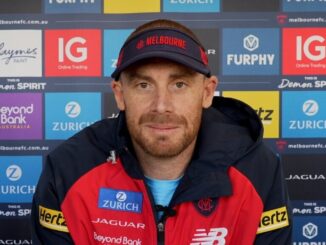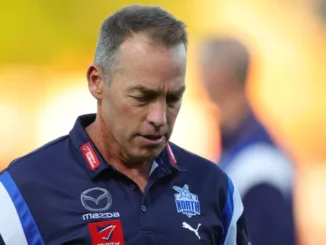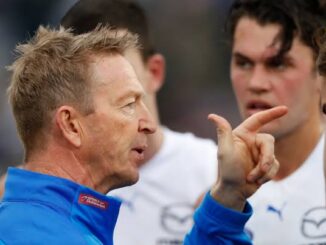
Nathan Schmook of AFL.com.au has provided an inside look at the Eagles’ 2024 season preparations.
ADAM Simpson sets the tone for the subsequent balancing act in the match committee room at West Coast. The coach tells his seven analysts and helpers, “I don’t want today to be a punch in the face,” as they get ready for a pre-season match review.
In a match simulation, the Eagles coaches will dissect their team’s defeat to Fremantle, which exposed some evident shortcomings they were aware of but also demonstrated the team’s advancement in areas on which they had recently concentrated their attention.
As everyone settles in and plugs in their laptops around a semicircle table in front of a large screen, Simpson says, “I need to make sure the positivity is at the right line today, but we can’t paper over the cracks.”
With new chief executive Don Pyke in place to lead the new era, West Coast has begun an aggressive rebuilding both on and off the field, having switched 18 list spots and 14 football department roles in the last two years.
Between the Eagles’ two preseason games, AFL.com.au was given behind-the-scenes access to the football department to witness the work that went into that reconstruction, as a youthful set of players and an enthusiastic coach embraced the task ahead.
Simpson believes that the Eagles’ 2024 campaign has a specific goal in mind, having last year believed that a return to the postseason was still feasible. This year is not like the others.
“There’s a sense of reality that we know what we’re trying to do, and we want to get better with things on-field that will take time,” Simpson stated to AFL.com.au.
“Where we’re going, better in the contest, furious pressure, and front-half footy are the bare minimums you need to make yourself competitive. We are unable to proceed until we have checked those boxes.
“It’s quite clear from the clarity you see now that we’ve returned to the draft, and the locker room seems different. The children are now in charge.”
In this critical week leading up to the preseason, Simpson is coding “appreciation clips” that he will play for the players to counterbalance the coaches’ criticism. These show every player celebrating a goal kicked by teenage ruck Coen Livingstone, Reuben Ginbey pressing forward to provide pressure, and co-captain Liam Duggan lifting Harley Reid off the ground. Every one of them has to do with the “identity” the gamers are creating.
In order to aid in the review, each player also responded to two questions following the Fremantle game: one about themselves and the other about a teammate. Callum Jamieson, the ruckman, was especially appreciated by his teammates for taking on a new role on the backline.
On the other hand, a lack of communication and connection in team defence and a structural breakdown at long, down-the-line plays that will set up one of the coaching objectives for the week will be the negative aspects.
The variety of tapes the coaches watch together makes it evident that they are aware of the many problems brought up in the 52-point defeat. However, they carefully consider which structural vision is most crucial to emphasise to the players.
“I don’t want to break ’em,” Simpson responds, characterising the defeat as “an opportunity to educate” and securing a select few videos to show and discuss during a soon-to-be 30-minute team meeting. Duggan’s constant support and nurturing of Reid is one of them.
“We’ve just got to reward that, knowing we’ve got work to do,” says the trainer.
Simpson kicks off the squad meeting by reminding everyone of the’manic pressure, contest, front-half footy’ on-field identity that the Eagles are targeting, along with a rundown of how each is accomplished. He strolls down the side of the auditorium, stepping up and down the steps with energy.
There’s a positive to kick off the meeting with a special mention for injured midfielder Elijah Hewett, who was at every break with the team, including those that weren’t attended by line coaches. “That’s a really good ‘one-team’ mentality,” Simpson says.
The coach now wants the players to talk for 20 seconds among themselves about why the team lost the game, seeking feedback from the floor. For premiership forward Jamie Cripps it was fundamentals, while young goalkicker Ryan Maric has a structural observation the coaches had noted.
The fundamentals will be addressed on the track, where Simpson asks his players to focus on how well they prepare and train every session. The structure against Fremantle will be addressed now, as players and coaches go back and forth, working through specific scenarios from the game.
“You’ll get better at this if you care about it, and I know you do,” Simpson says.
Between pulling apart the Fremantle loss and preparing for the final practice game against Adelaide, football manager Gavin Bell is delving into the Crows’ own rebuild in a detailed address to football department staff that gives context to West Coast’s position in 2024.
Using Brisbane under Chris Fagan as another case study, Bell is outlining the two rival teams’ list demographics, how they changed over four years of draft-led rebuilding, and what the Eagles can learn from them.
The club has also analysed its own history and list demographics through successful rebuilds that led to the 2006 premiership and a later run of six consecutive seasons in finals, that included the 2015 Grand Final and 2018 premiership.
Bell’s presentation in the club auditorium at 8am on a Tuesday shapes as a vision and blueprint for the Eagles’ rebuild and provides valuable context for everything the club’s staff, players and coaches are doing ahead of the 2024 season.
There is now a clear acceptance right across the club, including at board level, that West Coast is essentially at the start line of a build to top-four contention that will take years.
“We’ve got a picture through history of what these builds have looked like, and it’s given us a bit of a blueprint of the path we need to take,” Bell said.
“The key work we have done is getting a clear picture of what that top-four club needs to look like, being really aware and accepting of where we’re at, and not sugar-coating anything. We’re chipping away at the key gaps between where we are and where we want to get to.”
Adelaide finished 18th with three wins in its first year under Nicks, the pandemic-shortened 2020 season, while Brisbane managed five wins under Fagan in 2017 on its way to a wooden-spoon finish.
Like West Coast leading into 2024 – albeit without changing coaches – both clubs had started the process of rebuilding through the draft by using two top-10 draft picks in the two years leading up to their first seasons under Nicks and Fagan.
They shape as good blueprints to follow, given the deeper than usual list cuts both undertook and how those changes are now also mirrored at West Coast after farewelling its 2018 premiership core.
Of the 18 players West Coast has welcomed in the past two off-seasons, 16 are aged under 21. With that change, Simpson has also adjusted his coaching methods and the game style he is teaching.
A change that co-captain Oscar Allen has noticed is Simpson’s willingness to let players mould the on and off-field direction the club wants to head, with players of all levels helping to “formulate the style we want to play”.
Eagles with experience at other clubs who also happen to be footy heads, like Matt Flynn, Alex Witherden and Jayden Hunt, are tapped into through a ‘footy sub-committee’ that gathers weekly to share its insights with Simpson.
Young players have also provided feedback in meetings that have prompted some of the best adjustments the Eagles have made to their plans this pre-season, according to Allen.
“In the position we’re in,” Duggan adds, “it would be really easy for him to just want to take over everything and have control over every moving piece. But I feel like he’s had a great approach to that side of training.”
Allen and Duggan are fresh off a breakfast appointment with the Western Australian Governor, the Honourable Chris Dawson AC APM, highlighting how their lives have changed since taking over the captaincy as a duo following 2018 Norm Smith medallist Luke Shuey’s retirement.
They’ve been influential in their first three months as co-captains, particularly through their work in guiding the players on a new identity – essentially a trademark or set of standards – that the group wants to hold itself to.
Broadly, the Eagles players want to be a connected group that turn up for each other and pick each other up, bringing their personal strengths to the team. There is a final element to their identity, however, that they are still working through ahead of round one.
“They are pillars that we’re going to live by. It’s new to us this year and mainly driven by the players,” Duggan said.
“We’re still figuring out that middle one, and part of that is still learning what our identity is. We know the direction we’re heading, but what does that look like on and off the field and what does it mean to us?
“The best part of having 22 blokes under 22 is that they really want something to grab a hold of and sink their teeth into. They want to listen, they want to be around, and they want to be a part of something bigger.
“That’s been really pleasing that everyone’s bought into that so much, and we’ll finalise it in the next week or so and have that ready for the season.”
Duggan and Allen, 27 and 24 respectively, are ideal co-captains for the rebuilding Eagles, with their careers including the most recent successful era but their ages keeping them connected to all sections of the list.
It’s a trait Simpson draws on when he meets with the pair and vice-captain Tom Barrass for a weekly check-in.
He gets their thoughts on everything from game style ideas, how he thinks the players will respond to a specific selection idea being floated, and how the confidence of the player group is after the Fremantle game.
He’s keen to hear from Duggan on how his partnership with Reid, in which they swap between half-back and the midfield, is going, and what they can do to support their No.1 draft pick more and get the ball in his hands.
Four days later, Reid will have 20 disposals and five clearances against Adelaide, rebounding in a big way and showing all his strengths in the Eagles’ final pre-season game before round one.
The ability to read a room, engage the players, and make the complex simple remains at the core of Simpson’s coaching. Stopping a team meeting to host a maths quiz is just one example of the coach re-engaging the players after sensing they were becoming restless.
Then there are his standards, which he directs the players towards in individual catch-ups three times a season.



Be the first to comment